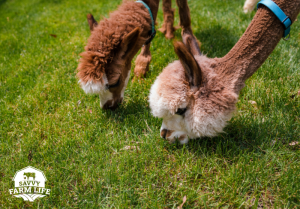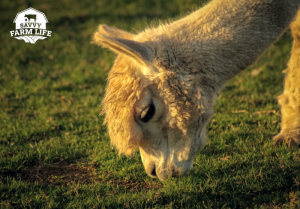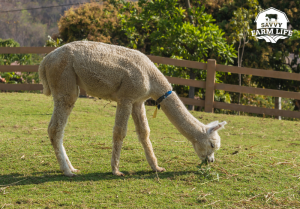What Alpacas Can (And Can’t) Eat
If you are considering adding an alpaca to your homestead, you will need to know what you can and cannot feed them. Knowing what, and how, to feed your livestock is one of the most important aspects to ensuring they are properly cared for.
So, what. can alpacas eat? The bulk of your alpaca’s food intake should be from hay, pasture, and tree and shrub leaves that they forage for themselves. Alpacas do love treats however. Alpacas can have many fruits and vegetables, with some notable exceptions.
Read on to learn more about what you can, and can’t, feed your alpaca.
What Your Alpaca Should Be Eating Daily
Pasture or hay should be the main ingredient in your alpaca’s regular diet. Alpacas are pseudo-ruminants, meaning that they have three stomach chambers (true ruminants like cows have four chambers). The way that alpacas digest food allows them to be very efficient eaters, with the ability to turn a relatively small amount of feed into sufficient energy. Alpacas should eat around 1.5% to 2% of their body weight in fodder every day – this means around two pounds of hay or pasture daily for a 125 pound alpaca.
Which Variety of Hay (or Pasture) to Feed Alpacas
There are several different types of hay and pasture, and it is important to know which ones will work best for the alpaca’s digestive system. The best grasses for alpacas are Bermuda, Bahia, and orchard grasses. Clover and annual rye may also be a good choice, and is used by many alpaca farmers, but there is some controversy surrounding these two grasses. If you would like to feed clover or annual rye, please do your research and reach out to your veterinarian for advice.
Alfalfa is popular but should be fed sparingly, because of the rich protein content. Too much alfalfa will cause digestive upset in an alpaca. Additionally, alpacas should avoid fescue and perennial rye. These grasses were designed to include endophytes to help control insects. Endophytes release a neuro-toxin and can cause a health concern in alpacas called staggers, which is a neurological disease that is treatable if caught early, but irreversible once established.
Supplemental Feed For Your Alpaca 
In addition to hay and pasture, you may wish to supplement your alpaca’s intake with commercial livestock feed, or grain. Not every alpaca farmer supplements with feed, but if you have a pregnant or lactating female, an older animal, or for other health reasons your veterinarian suggests you do so, you may add a commercially available feed to your alpaca’s diet.
If you are providing commercial feed to your alpaca, you must make sure that it is safe for alpacas to eat. Some trusted brands of alpaca feed include (but are not limited to) Mazuri, Nutrena, Blue Seal, and Kent. It is crucial that you avoid any feed that contains Ionophores. Ionophores are a class of antibiotics commonly fed to many livestock but are toxic to alpacas. You will need to watch out for any ingredient list that includes Rumensin, Lasalosid, or Salinomycin. In addition, some commercial feeds will emphasize that they were created in an “Ionophore-free” facility, which means they would be safe for animals that are sensitive to this ingredient.
Mineral Blocks
Like sheep, alpacas are prone to copper toxicity and should never be given a salt block. If you would like to provide a mineral block to your alpaca, you can purchase one that is formulated specifically for sheep. Some farmers also crush up salty chips and add them to their alpaca’s feed – if you choose to do this, make sure that you do so in moderation!
Acceptable Treats for Alpacas
In addition to their pasture and commercial feed, alpacas love the occasional treat, and their humans usually love providing them with treats as well! Treats are not only a way to add additional vitamins into your alpaca’s diet, but can also be a great training tool for them. So what kinds of treats are best for alpacas?
Fruits and Vegetables to Feed Your Alpaca 
Alpacas are herbivores, and love most bite-sized fruits and vegetables. Of course, there are always exceptions and some fruits and veggies can harm an alpaca’s health. Some of the most popular fruits and vegetables to supplement an alpaca’s diet with are:
Apples
Apples are one of the most popular alpaca treats. Apples can provide your alpaca with potassium, polyphenols, fiber, and carbohydrates. Polyphenols are plant compounds that can improve your digestive, brain, and heart health.
Bananas
Bananas can provide your alpaca with vitamins A and B, potassium, and healthy fiber. Bananas are a carbohydrate-filled treat that your alpaca will love, and is soft and easy for them to eat.
Beets
Pregnant and lactating alpacas love beets, and beets will provide a boost of vitamins C, B, folate, manganese, potassium, and fiber. Beets are also easy to grow, and easy to store.
Carrots
Of course, another favorite of alpacas are carrots. Carrots are also a good choice for alpaca farmers because they are inexpensive, long-lasting, and available year-round (they can also be grown year-round in many regions, if you are a gardening enthusiast!). Carrots will provide a boost of vitamins A, B, and C, potassium, and of course carotene which will improve eye and heart health.
Celery
Celery is a healthy treat, in moderation, for alpacas, which will provide manganese, potassium, phosphorus and calcium. Celery does contain furocoumarins, which can lead to sun sensitivity in alpacas if eaten in excess. For this reason, celery is a healthy choice if fed in moderation.
Dandelions
Dandelions are a favorite of alpacas, and can give them a boost of manganese, folate, magnesium, and phosphorus. Dandelions are good for immune system and kidney health, and as a bonus, can easily be grown (or found) in most regions.
Grapes
Grapes are another healthy treat, giving your alpaca vitamins C, K, and antioxidants. Antioxidants can mainly be found in the skin of the grape, but alpacas also enjoy eating grape leaves and vines. Alpacas may avoid sour grapes, but will enjoy sweeter, milder grapes.
Green Beans
Green beans are high in vitamins A, C, manganese and folate, and are a high-protein snack your alpacas will enjoy. Alpacas prefer fresh green beans (and fresh produce, in general), so likely will not eat previously-frozen or canned green beans.
Pineapple
Pineapple is a popular treat that many alpaca farmers enjoy providing their animals. Pineapple provides several vitamins, in addition to the minerals potassium, magnesium, iron, zinc, and manganese. These minerals are shown to help keep muscles, teeth, and bones healthy, and to aid in milk production.
Pumpkin
Pumpkins are a delicacy for alpacas, and provide a range of vitamins and minerals to help boost their health, including the important carotene for eye and heart health.
Raisins
Raisins are another fun treat to feed your alpaca! Raisins have the vitamin and mineral content of grapes, but be sure to feed in moderation because of the high sugar content. An added bonus of raisins is that they are small and soft, so there is no need to prepare them before giving them to your alpaca.
Strawberries
Like humans, alpacas love strawberries (so long as they are ripe and sweet, and not sour). Strawberries will provide a sweet boost of vitamin C, fiber, and potassium to your alpaca’s diet.
Sweet Potato
Sweet potatoes can be fed to your alpaca either raw or cooked, with each method having its own benefit. If fed cooked, sweet potatoes will help an under-weight alpaca gain weight, and wed fed raw, will provide liver support. Sweet potatoes are high in vitamins A, B, C, and manganese and potassium.
Watermelon
Watermelon is a healthy treat to feed your alpaca, especially in the heat of Summer. As they are 90% water, watermelon will help not only provide a sweet treat to your animal, but also help to keep them hydrated. For an extra fiber boost, feed watermelon with the rind attached. Alpacas can, and will, eat the watermelon rind and vines in addition to the fruit.
Yarrow
Yarrow is a readily available plant in most regions, and is a tasty treat for alpacas. Yarrow is excellent for immune system and heart health, and can be easily cultivated in most areas (or found growing as a “weed”!).
Additional Treats To Feed Alpacas
While this is not an exhaustive list, some additional treats that you may feed your alpaca include pears, plums, peanuts, blackberries, raspberries, cantaloupe, squash, peaches, cucumbers, and spinach.
Tree Leaves that Are Safe for Alpacas to Eat
In addition to the treats you may want to provide for your alpaca, they will likely go foraging for their own treats in the form of tree leaves and needles. Not all tree leaves are safe for alpacas to eat, but many are not only safe to eat, but are enjoyed and sought out by alpacas. Some of these safe treats include Mulberry, Sweetgum, and Weeping Willow leaves, and Spruce and Pine needles. These are not only a beneficial addition to the alpaca’s diet, but also a benefit to the farmer as well when it comes to leaf and needle litter.
An Important Note About Feeding Your Alpaca Treats
One important note when it comes to feeding your alpaca treats, is how to feed them. Even though alpacas do have back molars, alpacas are not efficient at chewing. For this reason, it is imperative that you cut any treats into bite-size pieces. Most food is swallowed whole by alpacas, traveling down their long throats and into their stomach chamber to digest. If you feed your alpaca a treat without first cutting it up, they may easily choke.
When feeding treats such as apples, carrots, beets, or other hard and large produce – make sure you either cut them into small, bite size pieces or shred them. When considering how large to cut the pieces, think about how large you would cut a piece for yourself. Alpacas love shredded produce – not only is it delicious but easy to chew and digest.
When you give your alpaca a treat, feed it as you would feed a horse a treat – stretch out your hand and place the food in your palm. Keep your fingers and thumb tight together – otherwise they may be mistaken for baby carrots!. If an alpaca bites while getting a treat it is likely not intentional – your alpaca is just excited! – but if you feed them treats in this manner you will be less likely to be accidentally nibbled on along with the tasty apple or banana.
What Not To Feed Alpacas 
There is a long list of treats that you can safely feed your alpaca. Unfortunately there is also a long list of what you should NOT feed your alpaca. The following lists are not meant to be exhaustive, so please always consult a veterinarian if you are concerned about your alpaca’s diet and what you can and cannot feed your animal.
Of course, because your alpaca is an herbivore, you should not give them any animal products to eat, including dairy and eggs. The digestive system of an alpaca is not meant to process animal products, and this can lead to stomach upset or other negative side effects.
Avocados
You should avoid giving avocados to alpacas, as they contain a fungicidal toxin known as persin. Alpacas are not able to digest persin, and it can lead to digestive and respiratory illness.
Cherries
Cherries can lead to cyanide poisoning if alpacas eat them, particularly the leaves. Sprouts, twigs, and seeds can also be toxic.
Corn
Corn, in excess, can lead to weight gain and diabetes because of the high sugar content. In addition, in areas of drought, corn plants will produce additional nitrates which can be problematic for alpacas.
Mustard Vegetables
Alpacas should not be given any produce from the mustard family of vegetables. This includes broccoli florets, brussels sprouts,kale, rutabaga, cabbage, and turnips. Vegetables in this category contain small amounts of sulfur, which will interfere with the alpaca’s red blood cells and ability for the body to carry oxygen.
One important distinction about broccoli – while the florets are problematic for alpacas, broccoli stems can be fed to alpacas and are a good source of vitamins and fiber. Just ensure you are not accidentally feeding any of the florets, if giving your alpaca broccoli as a treat.
Nightshade Fruits and Vegetables
Nightshade fruits and vegetables should also be avoided. Nightshade produce includes tomatoes, potatoes, eggplant, horse nettle, and peppers. Fruits and vegetables from this category contain alkaloids that can be potentially lethal to alpacas and may lead to vomiting, lethargy, and respiratory distress. Fruits and vegetables in this family are most dangerous when over-ripe.
Onions
Onions, if eaten in excess, can also cause cyanide poisoning in alpacas and can be lethal.
Plants Alpacas Should Not Eat
In addition to the above, there are several plants that your alpaca should not eat. These include (but are not limited to):
- Acorns
- Agave
- Amaryllis
- Arrowgrass
- Azalea
- Beans
- Begonia
- Bird of Paradise
- Black Locust
- Black Walnut
- Bleeding Heart
- Boxwood
- Buckwheat
- Buttercups
- Butterfly Weed
- Carnation
- Daffodil
- Daisy
- Daphne
- Elephant Ears
- Eucalyptus
- Foxglove
- Geranium
- Ginko
- Hemlock
- Hollies
- Hyacinth
- Hydrangea
- Irises
- Ivy
- Jonquil
- Juniper
- Lantana
- Larkspurs
- Laurels
- Lilies
- Lupine
- Mandrake
- Mesquite
- Milkweed
- Mistletoe
- Morning Glory
- Mushrooms
- Oaks
- Oleander
- Philodendron
- Poinsettia
- Poppies
- Pothos
- Privet
- Rhododendron
- Rhubarb
- St. Johns Wort
- Sorghum
- Snakeroot
- String of Pearls
- Tobacco
- Trumpet Vine
- Tulips
- Violets
- Wild Carrots
- Wisteria
- Yew
Any plant that includes the word “poison” in its name should not be eaten by alpacas.
Should Your Alpaca Eat Grain?
Grain is a controversial subject when it comes to most livestock feed. Alpacas love grain – who doesn’t? Some alpaca farmers have been said to cut sourdough bread into cubes and freeze them, giving a few at a time to their alpacas as a treat. But while alpacas love grain, their digestive systems cannot always say the same. While grain in moderation is acceptable to feed alpacas, it should not be given in excess. Given in excess, grain can lead to stomach upset and other gastrointestinal issues.
Additional Concerns When Feeding Alpacas
It (almost) goes without saying that you should make sure your alpaca is never eating any molds, fungus, or algaes. Alpacas are picky about their water and will not drink dirty water if given any other choice, but it is important to change your alpaca’s water daily so that they are not ingesting algae. Also regularly check your alpaca’s hay to ensure they will not accidentally consume mold, which will be harmful to their health (as it would be for any livestock or pet).
One final note about feeding your alpaca – if you ever have a question about whether or not it is safe to feed your alpaca a particular treat or fodder, always seek the advice of your veterinarian. They are the experts when it comes to your alpaca’s health and can advise you on your individual animal and what he or she needs.
P.S. Save this article to your “Alpaca” board using the button below!

